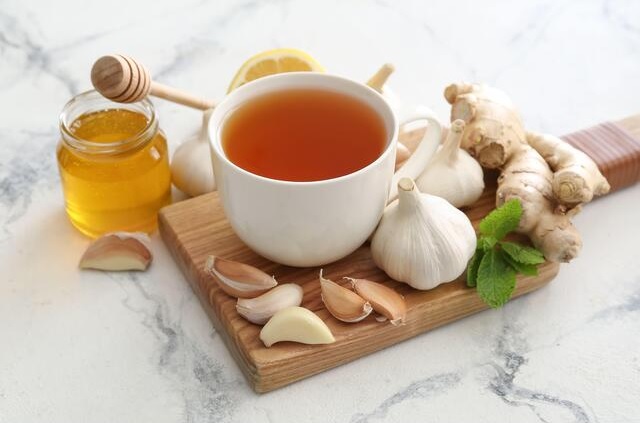
If you are looking for the best home remedy for stomach germs, follow this article from Alamo until the end.
Definite stomach microbe home treatment
Bad microbes and bacteria, often known as pathogenic bacteria or harmful microorganisms, are microorganisms that, when present in the human body, can cause infection, disease, or other health problems. In this article from Alamo, we will tell you what to eat and what not to eat for stomach germs for the home treatment of stomach germs.
Also read: time to take licorice for the stomach
Home treatment of stomach bacteria
The presence of microbes in the stomach can disrupt the balance of the human microbiome and lead to various health problems. While home remedies cannot completely eliminate gut microbes, they can help maintain a healthy balance and reduce the number of harmful bacteria. Some of the most effective home remedies for stomach ulcers are:
1. Home treatment of stomach bacteria with apple cider vinegar
Mix 1 to 2 teaspoons of apple cider vinegar in a glass of water and drink before meals. The acetic acid in apple cider vinegar may help kill harmful bacteria and improve digestion.
2. Treatment of stomach microbes with foods rich in probiotics
Include fermented foods such as yogurt, kefir and sauerkraut in your diet. These foods are rich in probiotics, which are beneficial bacteria that help maintain a healthy balance in the stomach.
3. Home treatment of stomach microbes with herbal teas
Teas such as ginger tea, chamomile tea, and peppermint tea have antimicrobial and anti-inflammatory properties that can help reduce harmful bacteria and soothe the stomach.
4. Home treatment of stomach bacteria with honey
Honey has natural antibacterial properties and can help inhibit the growth of harmful bacteria. Consume a spoonful of honey or add it to your tea for a soothing effect.
Spices such as turmeric, cinnamon and cloves have antimicrobial and anti-inflammatory properties. To support stomach health, include these spices in your cooking.
Also read: home treatment for burning in the outer part of the vagina


What foods are good for stomach microbes?
1. Foods rich in antimicrobial compounds
Garlic, ginger, coconut oil, and apple cider vinegar contain compounds that have antimicrobial properties and help reduce harmful bacteria in the gut.
2. Fermented foods useful for the stomach
Yogurt, kefir, sauerkraut, kimchi, and other fermented foods contain probiotics, which are beneficial bacteria that can help balance the gut microbiome.
3. Foods rich in fiber
Whole grains, fruits, vegetables, and legumes provide dietary fiber that supports the growth of beneficial bacteria and helps maintain bowel regularity.
4. Foods rich in prebiotics
Garlic, onions, asparagus, bananas, and artichokes contain prebiotics, which are compounds that feed the beneficial bacteria in your digestive tract and promote a healthy balance.
5. Foods rich in polyphenols
Berries, green tea, and dark chocolate are rich in polyphenols, which have antioxidant and anti-inflammatory properties that are beneficial for gut health.
6. Healthy fats
Omega-3 fatty acids found in fish, nuts, seeds, and avocados can help reduce inflammation and support overall gut health.
7. Herbs and spices
Turmeric, cinnamon, and peppermint have antimicrobial and anti-inflammatory properties that can help reduce harmful bacteria and support gut health.
Also read: How to know if the uterus is cold or warm
What should we not eat for stomach bacteria?
1. Do not take too many antibiotics
Frequent use of antibiotics can disrupt the balance of good and bad bacteria in the stomach and lead to overgrowth of harmful bacteria.
2. Do not eat contaminated food or water
Consuming food or water contaminated with harmful bacteria can lead to a stomach infection.
3. Do not eat processed and high sugar foods
A diet high in processed or sugary foods can increase the risk of harmful bacteria growing in the stomach, while a diet lacking in fiber and other essential nutrients can weaken the stomach’s defenses against infection.
Treatment of stomach microbes with garlic
Garlic contains a compound called allicin, which has antimicrobial properties. The allicin in garlic helps kill stomach microbes and heal peptic ulcers. Eat garlic in your meals or use garlic supplements to help reduce harmful bacteria in the gut.
Is ice cream good for stomach bacteria?
Contrary to popular belief, ice cream is not good for stomach bacteria. Ice cream is generally not recommended for people with stomach bacteria or infections, as it is difficult to digest and may worsen symptoms. Ice cream is full of sugar and fat, which is challenging for the digestive system to process. Excess sugar can also contribute to inflammation and promote the growth of harmful bacteria in the gut.
In addition, some ice cream flavors contain additives such as artificial colors, flavors, and preservatives that can cause gastrointestinal upset and worsen symptoms for people with stomach bacteria or infections.
If you’re struggling with stomach problems, it’s best to avoid ice cream and other sugary or processed foods until your symptoms subside. Choose bland, easy-to-digest foods such as plain yogurt, bananas, rice, applesauce, or boiled chicken to aid recovery. It’s also important to stay hydrated and get enough rest to energize your body to fight off any infection.
Also read: The reason for women’s nipples to become prickly


Figs for stomach microbes
Due to its nutritional properties, figs can be helpful in supporting a healthy gut and relieving some stomach related problems. However, it is important to note that they may not directly treat the bacteria or stomach infection. Figs contain a variety of nutrients, including fiber, potassium, and antioxidants that can contribute to overall gut health. The reasons why figs are useful for stomach microbes are:
1. High fiber content
Figs are rich in soluble fiber, which supports healthy bowel movements and can help relieve constipation. Fiber also acts as a prebiotic, feeding beneficial gut bacteria and promoting a balanced microbiome.
2. Anti-inflammatory properties
Figs contain compounds such as flavonoids and phenols that have anti-inflammatory effects. Reducing inflammation can reduce symptoms related to stomach problems.
3. Digestive enzymes
Figs contain digestive enzymes such as protease and invertase, which can help break down proteins and carbohydrates and promote digestion and absorption of nutrients.
Also read: The reason for the sudden drop of water from the vagina
Herbal medicine to kill stomach germs
While herbal remedies may help relieve some stomach-related symptoms, they are not usually recommended as a stand-alone treatment for stomach bacteria or infection. Herbal medicines are usually considered complementary or supportive measures to conventional treatment.
1. Ginger to kill stomach germs
It has anti-inflammatory properties that may relieve stomach upset and nausea.
2. Peppermint to kill stomach germs
It has a calming effect on the digestive system, which may help with bloating and cramping.
3. Thyme to treat stomach bacteria
Thyme is one of the herbal medicines for the treatment of stomach microbes, including Helicobacter. Thymol and carvacrol present in thyme extract are effective in the treatment of stomach microbes by disrupting the bacterial cell membrane. In addition, this plant has phenolic compounds that help reduce inflammation in the lining of the stomach.
4. Chamomile to eliminate stomach germs
It has a calming effect on the digestive system and may help reduce inflammation.
5. Black seed to kill stomach bacteria
Black seed is one of the potential treatments to eliminate stomach microbes. One of its most important ingredients is thymoquinone, which has antibacterial properties. In addition to preserving the beneficial bacteria of the digestive tract, consuming black seeds is useful in eliminating bacteria, including Helicobacter.
6. Licorice root to treat stomach infection
It has a soothing effect, that is, it can soothe the mucous membranes of the stomach and intestines.
Also read: What is the symptom of itching on the outer edges of the vagina?
last word
We hope that this article from Alamo with the title of definitive home treatment for stomach germs + What should we not eat and what should we eat for stomach germs? May it be useful for you companions. If you suspect an infection or are experiencing bowel-related problems, consult a healthcare professional for proper diagnosis and treatment.
RCO NEWS
RCO

















